'I always feel that to shake up human beings, you have to go a little extreme.'
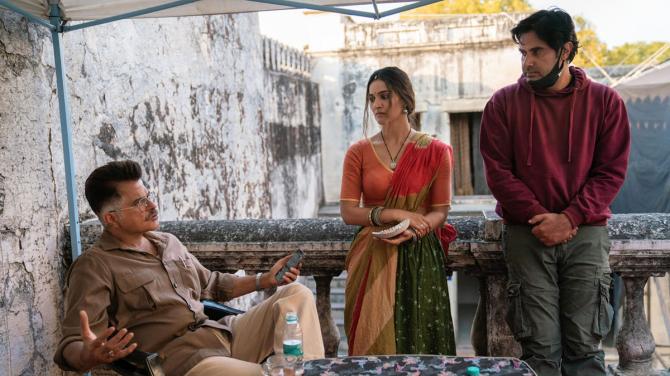
Raj Singh Chaudhary, who directed the Netflix film Thar, began his career doing small roles in films like Kuch Naa Kaho and Black Friday, before landing the lead in Antardwand.
He went on to write and star in Anurag Kashyap's gritty film, Gulaal. After making his directorial debut with Shaadistaan (starring Kay Kay Menon and Kriti Kulhari) last year, he moved on to his biggest venture till date, Thar, starring Anil Kapoor.
"We went to Anil Kapoor and told him we'd like him to play this character. He looked at us sternly, but then read the script. He loved it. Since I was a new director, he was a little sceptical. He was not sure if I would be able to pull it off," Raj tells Patcy N/Rediff.com.
What kind of response are you getting from the industry for Thar?
There has been a tremendous response. It's very good, more than what we expected.
The likes of Javedsaab (Akhtar) tweeted about it.
(Javed Akhtar tweeted: 'I have never met the director of Thar Raj Singh. My loss. I am so proud of this director who not only chose such a script but clearly added his own sensibility n sensitivity. Director like RSAC will become more n more important with time that is always kind to Genuine talent.')
Raj & DK also tweeted about it.
(Raj & DK tweeted: '#Thar is an authentic Indian 'western' that is brooding, simmering, intense and unpredictable. @AnilKapoor is outstanding! He has literally lived the cop he's playing, one of his coolest performances #HarshVarrdhanKapoor is as vulnerable as he is brutal. @fattysanashaikh delivers an honest and nuanced performance. @satishkaushik2 is immediately affable. Awesome cinematography, beautiful haunting locales… and above all assured direction by the debutant @rajsinghc)
Vikramaditya Motwane had good things to say.
Were you expecting this response?
We thought it would get a good response because of the film that we had made and because of its genre. But this is unprecedented.
We didn't expect it to become a huge success. Reviews-wise also, in India and internationally, it has been good.
There are a lot of conversations about the film, which is good.
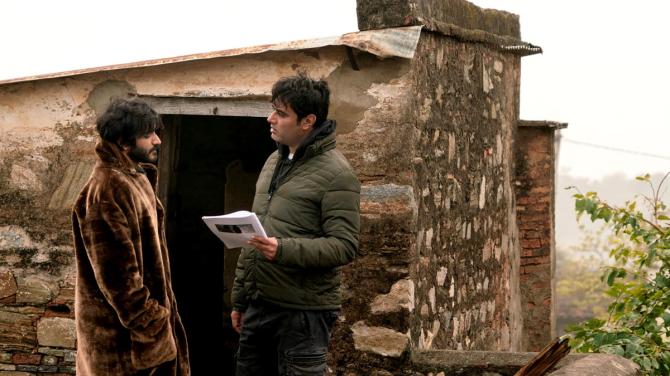
Any negative feedback?
Yes, that was there too. But that's good because that means there's a conversation happening, that people are thinking and talking about it.
I'm glad because I have always wanted to make people think and have a conversation.
How did you convince Anil Kapoor to produce and act in Thar?
As an actor, he has this amazing ability to understand and adapt to all sensibilities.
How it worked out was that Harsh was doing Bhavesh Joshi with Vikramaditya Motwane.
Vikram had read the script and really liked it.
I saw Harsh's Mirzya trailer and really liked him and his eyes.
I spoke to Vikram and he connected me to Harsh.
Harsh read the script, we had a chat and he came on board.
But all of a sudden, our producers Phantom Films disintegrated.
Harsh and I were figuring out what to do.
This character of Surekha Singh was perfect for Anil sir.
So we went to him, and told him that we'd like him to play this character.
He looked at us sternly, but then read the script. He loved it.
Since I was a new director, he was a little sceptical. He was not sure if I would be able to pull it off.
We had conversations and he was happy with the way I was talking to him about the film.
Anil sir jokes about it now and says, 'Everybody auditions actors, nobody auditions the directors, but I did.'
He asked us to shoot three scenes, so Harsh and I did. We edited it, did the background score, sound design and everything like a proper film.
We showed it to him in a preview theatre and he really liked it.
That's how he came on board.
And once he came on board, Netflix stepped in, because Anil sir was already doing AK Vs AK for Netflix.
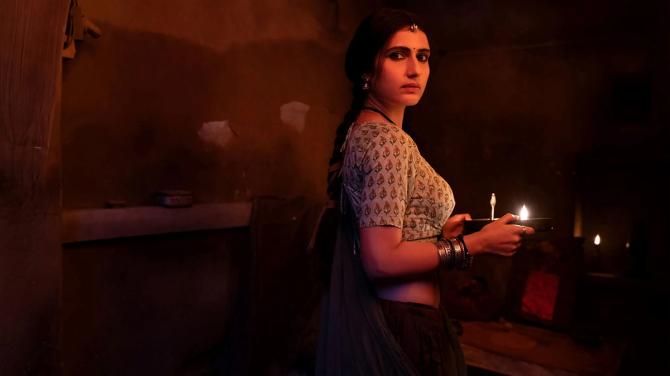
How did you cast Satish Kaushik and Fatima Sana Sheikh?
In these rustic interiors in the 1980s, the relationship between cops and their deputies went back 40 years. Their relationship is not about senior and junior anymore.
Bhure (played by Satish Kaushik) was a character who was junior to Anil sir, but they had this camaraderie since they went back a long way.
Anil sir came up with Satish sir's name.
I thought it was unusual casting. Obviously, he's a brilliant actor.
Also, Anil sir and he share that camaraderie as they have been friends for years. So it was perfect.
We reached out to Fatima; there was something interesting about her.
I have seen village women in Rajasthan, who wear ghoonghat. But I had a very clear visual in my head of a woman in a ghoonghat running with an axe and attacking someone, who had attacked her husband.
The first time I met Fatima, she was completely drenched in the rain.
I asked her what happened. She said she was travelling in an auto, but there was a road block. So she walked two kilometres in the rain.
She is a star in her own right -- she had already done Dangal -- but still, she gets off an auto and walks two kilometres in the rain!
She read the script and I took her through the film.
Then Anil sir spoke to her. We auditioned her, and she was fantastic.
She has a great screen presence, and she's a very good actor. She had that look and feel of the character.
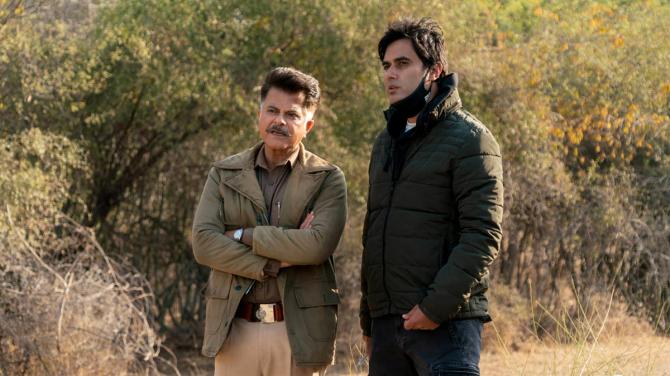
What was Anil Kapoor's reaction when he saw the film?
Being the producer and the actor of the film, he was there every step of the way.
He was even there while choosing the background music.
We showed him the first cut that Aarti Bajaj had edited and he really liked what he saw. Obviously, there were suggestions from him.
Then, there was Netflix. The process with Netflix is that every cut that you send to them, they will come back with feedback.
So it was an amalgamation of everybody's feedback.
Was Anil Kapoor interfering?
Not at all. He comes with 40 years of experience, so he brought a lot to the table.
He always said this is my opinion, see if it works.
He was always there during the shoot, but never interfering or imposing.
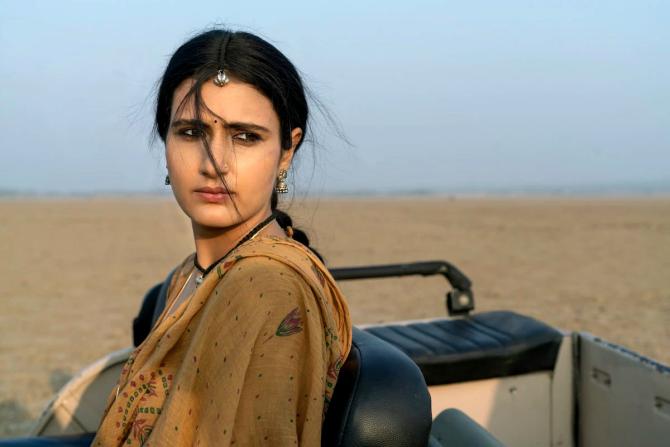
Why did you set the movie in the 1980s?
The biggest reason was that in this world, in the '80s, communication was zero.
Once you are there, there's no way anybody could get in touch with you.
I set it in the '80s because it was a very transformational era. I found that an interesting phase.
How difficult was it to shoot in Thar?
We shot in the winter, so it was extremely cold. But more than that, the terrain was very tough.
The places we've shot, we've had to walk half an hour with the equipment, walking uphill, but I was very clear about what visuals I wanted.
For example, the village was in the middle of nowhere, surrounded by mountains. The production team said there's no way we can shoot there logistically, but I wanted to. So they made it happen.
We built roads. These were areas with wild animals -- there was a panther attack on a stray dog -- so it was a very tough terrain.
Shooting those jeep sequences, those chases and the gunfights was not easy because anything that takes one hour in a normal set-up would take two-three hours there.
Thar has a lot of gore.
To shake human beings up, you need to go extreme.
I will give you an example.
Do you remember the picture of that Pulitzer Prize-winning photograph (external link) of an African kid, eating a morsel of food from the sand, and a vulture waiting for the kid to die? If that picture had not come out, nobody would have taken notice of Africa.
There was another sad picture of a Syrian refugee baby washed ashore on a beach. That is when the Syrian refugee crisis came to the fore and everybody in the world started talking about it, and doing things about it.
I always feel that to shake up human beings, you have to go a little extreme. That's why this violence and gore is there in the film, to shake things up.
What these antagonists have done to the protagonist's wife was just like Nirbhaya.
Only when we read about it, and we saw that whole thing, did we react. So that was the thought.
I wanted everybody to react in that sort of way, so I went extra on this.
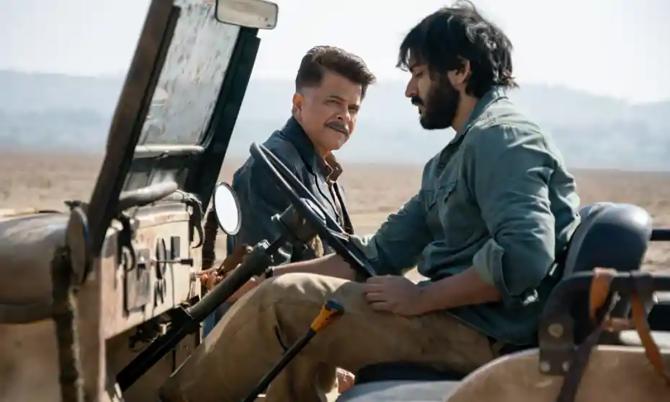
But the torture just goes on and on. You know there is something wrong, and that is why Harsh is reacting the way he is. Mandana Karimi's character comes at the end, and there's no time to sympathise with the two characters.
When we make a film and write scripts, there are so many permutation and combinations that we work towards.
So this was our script, and this was what we felt, without letting anything out.
There were a lot of discussions with people like Anurag Kashyap, who wrote the dialogue, Vikramaditya Motwane and many others. There were a lot of people involved.
When you read the script, you get opinions from a lot of people.
Like, even Fatima's character shooting in the end, there were a lot of debates regarding that as well.
You gave Fatima's character a happy ending.
I gave her hope, more than a happy ending.
She has a child that she has to live for and look forward to.
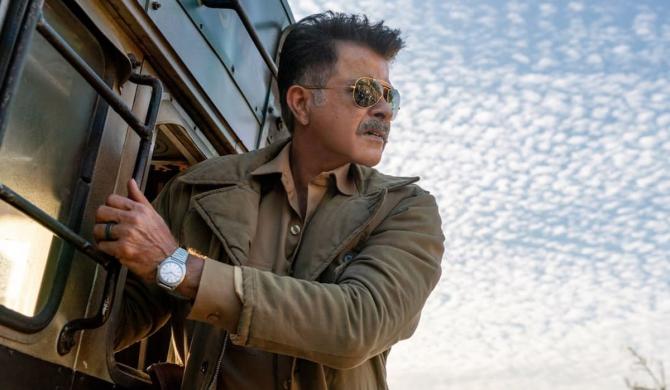
Did you choose Thar as a location because you are a Rajasthani?
I was born and brought up in Darjeeling, where my father owned a tea estate.
I visited Rajasthan a lot; my parents ensured that we went to our ancestral village during the holidays.
I know Rajasthan like the back of my hand.
I know the local language.
I know the culture.
But more than that, I used to love Western films as a child.
I saw a stark similarity between the landscape in those films and the landscape in Rajasthan.
The faces -- sunburnt, with beards and mustache, dirty feet, wrinkles... -- were also similar.
When I wanted to make this film, I thought it would be great to do a Western film in India. It organically fitted into this part of Rajasthan, which I have seen since childhood.
Nobody has done this before, so it would be unique in its own way.
Which directors influenced you?
I like Clint Eastwood's Western films; Director Sergio Leone was good.
His films like The Good, The Bad, The Ugly, A Fistful of Dollars, George Roy Hill's Butch Cassidy And The Sundance Kid.
In today's times, Quentin Tarantino's Western films like Django Unchained.
There is Godless on Netflix.
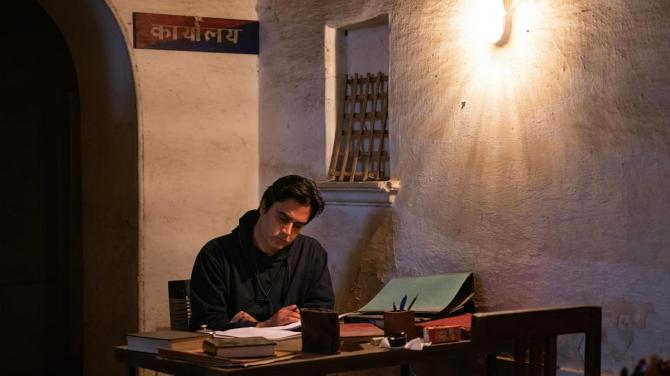
You started as a model, did engineering, started a business, went into losses and then decided to come to Mumbai...
I did modeling because I was a tennis player. I was very fit, tall.
I was doing my software engineering, when somebody told me that I should model. I said no.
But you make Rs 30,000-Rs 40,000 a month. You have these parties, you are on hoardings, you are the most popular guy in college... so it's fun!
I was supposed to go to the US for my master's. I had applied and gotten admission, but before that, I started a company with two of my friends in Bangalore. But they cheated me.
I went back to Kolkata where my parents were. One of the Bengali directors had seen an ad of mine on TV and offered me a film. He wanted me to come to Mumbai to do an acting workshop for the film.
So I deferred my admissions, you could do that in those days.
My father supported me. In fact, the leather jacket that Anil sir is wearing in Thar belongs to my (late) father.
My father always rode the Yezdi bike, so I paid homage to him through this character.
The location where the dead buffalo was is just 3 km away from my ancestral house.
Anyway, I came to Mumbai, did the workshop, but the film kept getting postponed, and eventually got shelved.
I was lost; did not know what to do.
That's when I saw Satya.
I thought nobody had made something like this on a college campus.
So I wrote a script based on that and that was Gulaal.
Anurag Kashyap was directing Paanch then. I knew a actor from that film, and that is how I met Anurag.
He really liked what I had written for Gulaal, and that's how I started working with him.
I worked in Black Friday as an actor and assistant.
I also wrote No Smoking with him.
Slowly, I realised that I wanted to write and direct too.
I wanted to be a part of films.
I made my first film Shaadisthan last year.
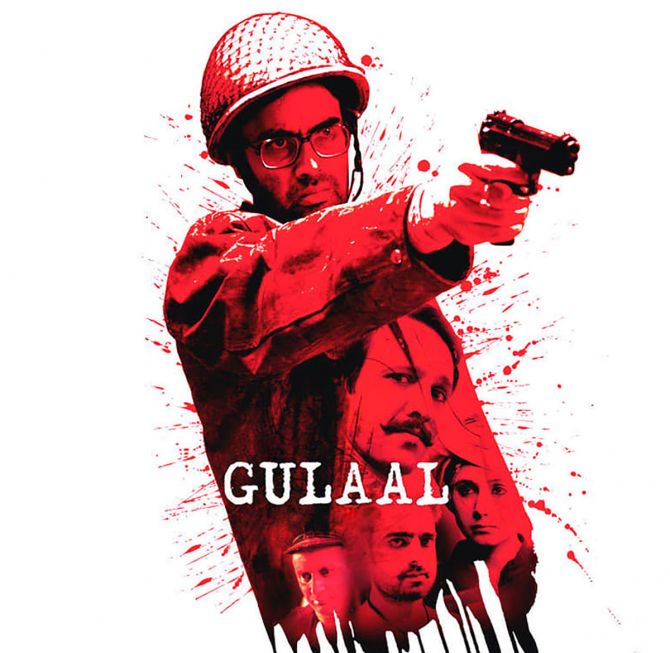
What did your mentor Anurag Kashyap say about Thar?
He really liked it too. He had always liked the script because he was the one who was supposed to produce it earlier.
He sat on the dialogues with me; he also sat on the edit and doctored it.
He is very happy with it. He told me, 'From here, you can't come down. You just have to go up and up. So do films that you create your own identity, that this is a Raj Singh Chaudhary film. Create your own space.'
What next?
I am doing another film with Anil sir; we are still working on it. There are two other scripts that I'm writing.
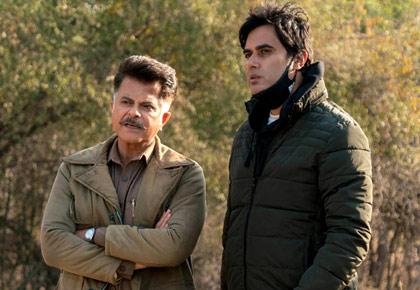


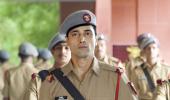





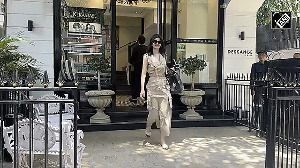


 © 2025
© 2025